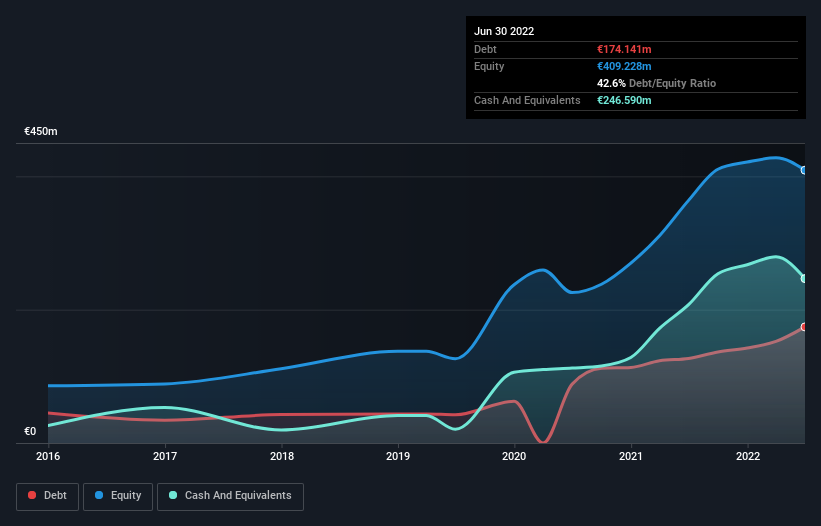David Iben put it well when he said, 'Volatility is not a risk we care about. What we care about is avoiding the permanent loss of capital.' So it seems the smart money knows that debt - which is usually involved in bankruptcies - is a very important factor, when you assess how risky a company is. We can see that Salcef Group S.p.A. (BIT:SCF) does use debt in its business. But is this debt a concern to shareholders?
What Risk Does Debt Bring?
Generally speaking, debt only becomes a real problem when a company can't easily pay it off, either by raising capital or with its own cash flow. In the worst case scenario, a company can go bankrupt if it cannot pay its creditors. However, a more common (but still painful) scenario is that it has to raise new equity capital at a low price, thus permanently diluting shareholders. Of course, plenty of companies use debt to fund growth, without any negative consequences. When we think about a company's use of debt, we first look at cash and debt together.
See our latest analysis for Salcef Group
What Is Salcef Group's Debt?
The image below, which you can click on for greater detail, shows that at June 2022 Salcef Group had debt of €174.1m, up from €126.9m in one year. But on the other hand it also has €246.6m in cash, leading to a €72.4m net cash position.

A Look At Salcef Group's Liabilities
Zooming in on the latest balance sheet data, we can see that Salcef Group had liabilities of €277.4m due within 12 months and liabilities of €121.8m due beyond that. Offsetting these obligations, it had cash of €246.6m as well as receivables valued at €255.2m due within 12 months. So it can boast €102.6m more liquid assets than total liabilities.
This surplus suggests that Salcef Group has a conservative balance sheet, and could probably eliminate its debt without much difficulty. Succinctly put, Salcef Group boasts net cash, so it's fair to say it does not have a heavy debt load!
But the bad news is that Salcef Group has seen its EBIT plunge 12% in the last twelve months. If that rate of decline in earnings continues, the company could find itself in a tight spot. When analysing debt levels, the balance sheet is the obvious place to start. But ultimately the future profitability of the business will decide if Salcef Group can strengthen its balance sheet over time. So if you're focused on the future you can check out this free report showing analyst profit forecasts.
But our final consideration is also important, because a company cannot pay debt with paper profits; it needs cold hard cash. While Salcef Group has net cash on its balance sheet, it's still worth taking a look at its ability to convert earnings before interest and tax (EBIT) to free cash flow, to help us understand how quickly it is building (or eroding) that cash balance. Looking at the most recent three years, Salcef Group recorded free cash flow of 23% of its EBIT, which is weaker than we'd expect. That's not great, when it comes to paying down debt.
Summing Up
While we empathize with investors who find debt concerning, you should keep in mind that Salcef Group has net cash of €72.4m, as well as more liquid assets than liabilities. So we don't have any problem with Salcef Group's use of debt. The balance sheet is clearly the area to focus on when you are analysing debt. But ultimately, every company can contain risks that exist outside of the balance sheet. For example, we've discovered 3 warning signs for Salcef Group that you should be aware of before investing here.
If you're interested in investing in businesses that can grow profits without the burden of debt, then check out this free list of growing businesses that have net cash on the balance sheet.
New: Manage All Your Stock Portfolios in One Place
We've created the ultimate portfolio companion for stock investors, and it's free.
• Connect an unlimited number of Portfolios and see your total in one currency
• Be alerted to new Warning Signs or Risks via email or mobile
• Track the Fair Value of your stocks
Have feedback on this article? Concerned about the content? Get in touch with us directly. Alternatively, email editorial-team (at) simplywallst.com.
This article by Simply Wall St is general in nature. We provide commentary based on historical data and analyst forecasts only using an unbiased methodology and our articles are not intended to be financial advice. It does not constitute a recommendation to buy or sell any stock, and does not take account of your objectives, or your financial situation. We aim to bring you long-term focused analysis driven by fundamental data. Note that our analysis may not factor in the latest price-sensitive company announcements or qualitative material. Simply Wall St has no position in any stocks mentioned.
About BIT:SCF
Salcef Group
Designs, constructs, and maintains railway infrastructure and civil works worldwide.
Excellent balance sheet with reasonable growth potential.
Market Insights
Community Narratives



